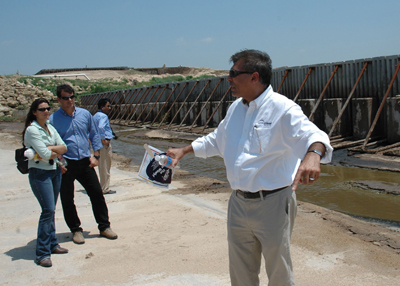
The question is not if those involved in animal waste management can afford to attend the upcoming conference; it’s whether they can afford not to, according to Dr. Saqib Mukhtar, Texas AgriLife Extension Service agricultural engineer.
The question is not if those involved in animal waste management can
afford to attend the upcoming conference; it’s whether they can afford
not to, according to Dr. Saqib Mukhtar, Texas AgriLife Extension
Service agricultural engineer.
 |
|
| Dr. Saqib Mukhtar, a Texas AgriLife Extension Service agricultural engineer, explains a manure management system to a group of tour participants. Submitted photo |
It’s been 10 years since the last manure management conference, Dr.
Mukhtar said. Since that time, there have been major advances in
technology to help manage animal manure and process generated
wastewater. There have also been considerable changes in state and
federal regulations governing concentrated animal feeding operations
and the manure they produce.
Set for Sept. 29 and 30 at the Austin Marriott North in Round Rock,
Texas, registration for the two-day event is $75 until Aug. 1 and $125
thereafter, he said.
“This conference is an excellent opportunity for participants to learn
about new advances in animal manure and animal mortality management,”
Mukhtar said. “They will also have face-to-face interaction with
engineers, scientists, regulators and producers and discuss future
environmental challenges faced by Texas animal agriculture.”
Also, conference speakers will address the new technologies being examined that hold promise in producing energy from manure.
“We have lots of energy in animal manure besides its fertilizer
potential,” he said. “(But the question is) can we gasify manure to
generate power efficiently?”
Other issues to be discussed will include odor management, measurement
and mitigation of gaseous and particulate matter (dust) emissions and
proposed U.S. Environmental Protection Agency rules requiring confined
animal feeding operations to monitor greenhouse gases.
“We have a couple of speakers who will address environmental issues,”
he said. “[Such as] what are some of the regulations in the context of
keeping our environment clean and what is expected of animal feeding
operations.”
The conference will also address some of the public perceptions that need be addressed by the animal feeding industry, he said.
“I look forward to a productive discussion on these issues,” Mukhtar said.
Regularly updated detailed conference programming can be found online at http://grovesite.com/tamu/tammi.
Texas nutrient management specialists may earn 8.75 continuing
education units. Managers of concentrated animal feeding operations may
earn nine Dairy Outreach Program Area credits. And professional
engineers may earn one hour of ethics training and eight professional
development hours.
Participants may register online at http://www.peopleware.net/1542b.
Participants may also register by mail or fax by contacting Kay
Sanders, Conference Services, 1232 TAMU, College Station, TX
77843-1232. Contact Sanders at 979-845-7684 or k-sanders@tamu.edu.
A block of rooms at the Marriott have been reserved for the conference
at $85 per night. Reservations can be made by phone, 512-733-6767, or
on the Internet at http://marriott.com/hotels/travel/ausno?. The group
code is tmmtmma. The cutoff date to register at the group rate is Sept.
7.
Participants may also contact Mukhtar for more information at 979-458-1019 or mukhtar@tamu.edu.
“At the same time we address these issues, we have to keep in mind that
we want to maintain a thriving livestock and poultry production
industry,” he said.